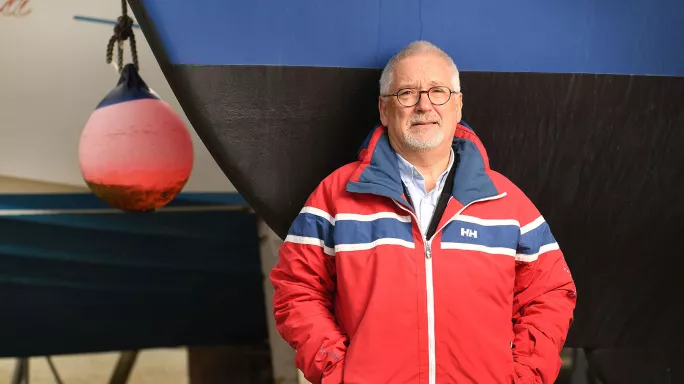- Home
- ‘There’s a fear in schools these days - my union work has gone from 3 cases a year to 300 a year’
‘There’s a fear in schools these days - my union work has gone from 3 cases a year to 300 a year’

Too many teachers are on medication for anxiety or depression, according to Dave Kitchen.
As the incoming president of the NASUWT teaching union about to chair one of the big two Easter teaching conferences, in Belfast this weekend, he might have at least some cause for anxiety himself. But Kitchen is focused on the plight of growing numbers of his members and points out that Easter (along with September) is the worst time of year of all for stress in teaching
Exam preparation, he says, leads to competition between teachers and an expectation in many schools that they give up part of their holiday break to run revision classes.
“Teachers are very tired at having completed two terms of hard work through the winter months and their resistance to stress is very low,” says Kitchen.
A symptom of teacher stress, he says, is the “rise in exam malpractice” where teachers are “fiddling or changing marks” - and that includes head teachers fiddling Sats results.
He was told recently by a head of maths that she’d been instructed by her head teacher to open the GCSE maths paper on the morning before the exam and go through it with pupils.
“It was an afternoon exam, and the head told her to get the kids in a room in the morning, open up the envelope and go through it. She mentioned it to me because she was a school rep. It didn’t happen. She didn’t do it, but it shows the pressure people are under.”
Fear in schools
Kitchen, 61, is far from stressed. The father-of-two (and of two step-children) has walked 10,000 paces (according to his smartwatch) around a zoo on a family day out before he meets Tes. In his spare time, he’s a sailor, which, he says, “helps tremendously to get away from the stress.” He is content and smiling despite broaching such a bleak subject.

He talks of a rise in teacher suicides, and self-harm that includes teachers cutting their wrists. He says most teachers are working more than 60 hours a week.
“There’s a fear in schools these days. There’s a tremendous sense of fear of speaking out of turn or doing anything wrong, and it’s all down to this business of accountability of teaching and assessing in a particular way,” says Kitchen.
When Kitchen first started doing casework for NASUWT as a rep in the mid-90s he only had about three cases a year, but 20 years later he was doing five or six a week.
“And they’re not straightforward nowadays,” he says. “Whereas before it was to do with, say, an early retirement or that someone’s been injured, now it tends to be very complicated. A lot of it’s around anxiety and stress.”
‘Huge wastage in schools’ takes money away from children - and teachers
Kitchen says teachers’ pay was, on average, 80 per cent of a school budget 15 years ago where as now it’s 56 per cent. He says 60 per cent of teachers did not get a pay rise last year and that more teachers are now getting into debt.
The average teacher, he says, has lost £28,000 in wages and pension contributions since 2008 by not being paid to the full rate of inflation.
“A lot of teachers can’t afford to teach. The government talks about pay rises but we haven’t had any pay rises [in real terms] and then there’s all the accountability pressures and the lack of pay progression. It’s not worth it.”
Yet at the same time, he points out that a “tremendous amount of money is being wasted with a complete lack of accountability.” He’s talking about consultants’ and executive head teachers’ pay and administration and management costs.
“Not long ago, you had something like 179 different employers running state schools [local authorities] whereas now you’ve got two or three thousand different employers [including multi-academy trusts and single academies] and with every MAT you’ve got a human resources section, business directors, and accountants and so on, and you’ve got the chief executive, of course, who will then have other heads underneath.

“Whereas before, you had a director of education in a local authority who would only be on, say £100,000, and would run 200 schools, but nowadays you’ve multiplied all the administrative costs so they’re sky high, and that takes a big chunk out of what should be there for the children.”
He laughs as if it’s almost too ridiculous to be true.
But he’s not joking when he says things, in some cases, are “out of control,” and then uses the word “corruption.”
“It’s a chaotic and incoherent system,” he says. “Within it, you’ve got shining examples of good practices, and then you’ve got some appalling examples of money being diverted out of the classroom and, for want of a better phrase, corruption.
“You’ve got money being divvied up [in MATs] among family members and you have businesses [being employed] which are related to the director and that sort of thing. It’s a question of morality. There is taxpayers’ money being taken out of the system and going into private bank accounts at the expense of the children, and parents.”
‘I know you’re gay - what’s the problem’
Kitchen, 61, is a religious studies teacher who began teaching in the late 70s in Dagenham, Essex. He’s now an adopted Scouser (in his local pub anyway) after 30 years in Liverpool. He came to the city in the 1980s, originally just for a year, after a divorce when he was “looking for something new.”
That something new was a job at a secondary school in Toxteth, as “head of multicultural education,” where he said “every day was an eye-opener.”
It was there he met his wife, who also had two boys the same age as his (now 37 and 42).
He is immensely proud of his eldest son, who came out as being gay in his mid-twenties. “What I find frustrating is that it took all those years, and he was about 23 or 24 before he could actually came out to us [about being gay]. We sort of knew before, but it had been difficult to talk.”

Kitchen says more needs to be taught in schools about same-sex relationships, and blames certain sections of the media for misrepresenting the issue around Parkfield primary, in Birmingham, where parents protested the LGBT curriculum.
“Actually, all that’s being talked about is that you get different sorts of families made up of different groups of people and that they ought to be respected. It’s not about an overt sex education programme showing plumbing and this that and the other.
“But if you look at what’s being talked about in the press you’ve got this gay sex curriculum - but it’s nothing like that at all.”
Kitchen recalls the night his son asked him if they could meet in a pub saying there was a problem he needed to talk about.
“I was thinking there’s a debt or something he wants me to pay off, and how much is this gonna cost me, and then he started talking about his mate and said ‘You know we’re friends? You know we’re gay?’ And I said yeah, I know you’re gay, but what’s the problem?”
Schools are sitting on a £billion surplus
Kitchen cites the DfE’s own figures which show that 90 per cent of schools have surpluses which added together make more than £4 billion, which, he says, would be enough to give every teacher a payrise of £8,000.
“Schools are allowed to have an 8 per cent surplus on their budget for a rainy day but we’re talking about excessive surpluses here.”
He laughs. Another ridiculous scenario, perhaps.
“It’s something we’re trying to get out head around. There’s that amount of money sitting there, and it’s not being used. So why?”
He agrees it could down to heads being “overcautious or over-prudent” but says it is worrying that teachers are now taking pay cuts to save the jobs of their colleagues, including two teachers who recently took a £7,000 pay cut.
“Heads will say they’re keeping money for a rainy day because they don’t know what’s going to happen with this that and the other, but yet they still say they need to cut staffing costs.
“But managers were using the cuts as an excuse to cut staff when, in fact, they weren’t losing as much money as they said were losing in the cuts campaign.”
Kitchen laughs at a ridiculous situation he found himself in not so long back when an academy hired a solicitor to sit in on a union meeting at which a teacher was appealing the fact that they hadn’t received performance-related pay.
“He didn’t say anything and why would he? Because there’s nothing relevant in law when you’re talking about a pay review. Effectively the school was saying we can’t afford to pay this person an extra £1,000 a year because of targets they hadn’t met, and I don’t know how much the solicitor at the other side of the table was being paid for staying there ‘til 7 o’clock in the evening, but it was probably about four or five hundred pounds, which would have been half of the pay increase we were talking about.”
Empowering teachers to stand up for themselves
Kitchen’s own father worked for the RAF in Bomber Command and had the dangerous task of loading aircraft with nuclear missiles at the height of the cold war (and unloading them again when the plane landed and the threat had been stepped down).
It makes you wonder how close the world was to a nuclear war. The problems faced by our country’s teachers pale into insignificance, by comparison. We’re not talking about the end the of the world here, after all.
Yet NASUWT says there’s a crisis, and as incoming president, you could say Kitchen will be loading up his own bombs and ammunition.
“The big push is trying to get more younger involvement and empowering them to stand up and not to just accept things and to work more as a group rather than on their own, not feeling helpless but always fighting,” he says. “We’re working really hard on empowering teachers and making them more assertive.
“And what we’re seeing more of is young teachers coming together and taking a stand against poor management practices and behaviour. I’m seeing local associations wanting to organise and get people to think more of us as a union rather than an insurance policy.”
Branches are being “re-energised” he says, for example, by changing the times they meet to Saturdays or by providing creches so younger members can bring children.
“[I’m talking about] fighting for a well-managed education system which uses all the resources it’s got effectively so we’re not losing money spent on things which are nothing to do with education like high executive salaries and accountancy firms.”
The NASUWT conference takes place in Belfast between 19 and 21 April.
CV - Dave Kitchen
Work
Robert Clack Comprehensive School Dagenham, 1979-1982, RE teacher
Parsloes Manor Comprehensive School (now Sydney Russel), Dagenham, 1982-1987, Head of RE
University Community Comprehensive School, Liverpool, 1987-1990 (part of this time was also working for Liverpool Support Service)
Advisory Teacher for Religious Education, Trafford Council, 1990-1993
Lostock High School (College) 1993- present, Head of RE, Head of PSRE, former Assistant Head, and now p/t teacher while on national union duties.
Examiner and assistant principal examiner for GCSE Religious Studies at Edexcel 1995-2011)
Union career
School rep at Parsloes Manor
School rep at Lostock
Health and Safety representative for Trafford Association.
Local Secretary for Trafford Association 2006-2017
National executive member for Greater Manchester 2011-2017
National Officer 2017-present
Keep reading for just £1 per month
You've reached your limit of free articles this month. Subscribe for £1 per month for three months and get:
- Unlimited access to all Tes magazine content
- Exclusive subscriber-only stories
- Award-winning email newsletters



